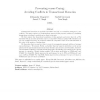Free Online Productivity Tools
i2Speak
i2Symbol
i2OCR
iTex2Img
iWeb2Print
iWeb2Shot
i2Type
iPdf2Split
iPdf2Merge
i2Bopomofo
i2Arabic
i2Style
i2Image
i2PDF
iLatex2Rtf
Sci2ools
103
click to vote
PODC
2009
ACM
2009
ACM
Preventing versus curing: avoiding conflicts in transactional memories
Transactional memories are typically speculative and rely on contention managers to cure conflicts. This paper explores a complementary approach that prevents conflicts by scheduling transactions according to predictions on their access sets. We first explore the theoretical boundaries of this approach and prove that (1) a TM scheduler with an accurate prediction can be 2-competitive with an optimal TM scheduler, but (2) even a slight inaccuracy in prediction makes the competitive ratio of the TM scheduler of the order of the number of transactions. We then show that, in practice, there is room for a pragmatic approach with good average case performance. We present Shrink, a scheduler that (a) bases its prediction on the access patterns of the past transactions from the same threads, and (b) uses a novel heuristic, which we call serialization affinity, to schedule transactions with a probability proportional to the current amount of contention. Shrink obtains roughly 70% accurate pred...
| Added | 25 Nov 2009 |
| Updated | 25 Nov 2009 |
| Type | Conference |
| Year | 2009 |
| Where | PODC |
| Authors | Aleksandar Dragojevic, Rachid Guerraoui, Anmol V. Singh, Vasu Singh |
Comments (0)

